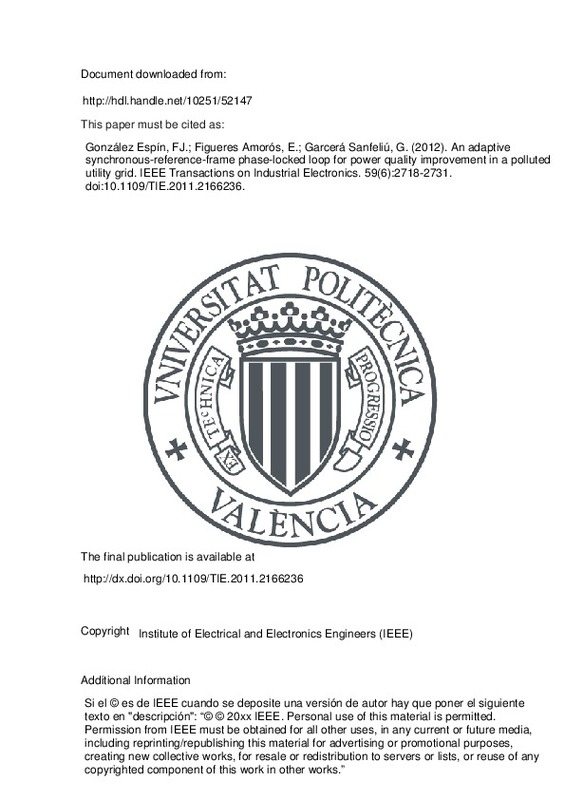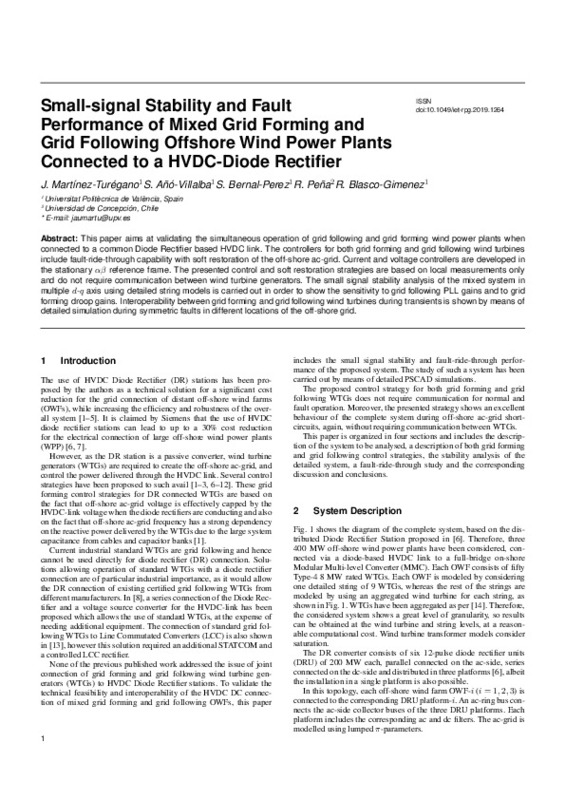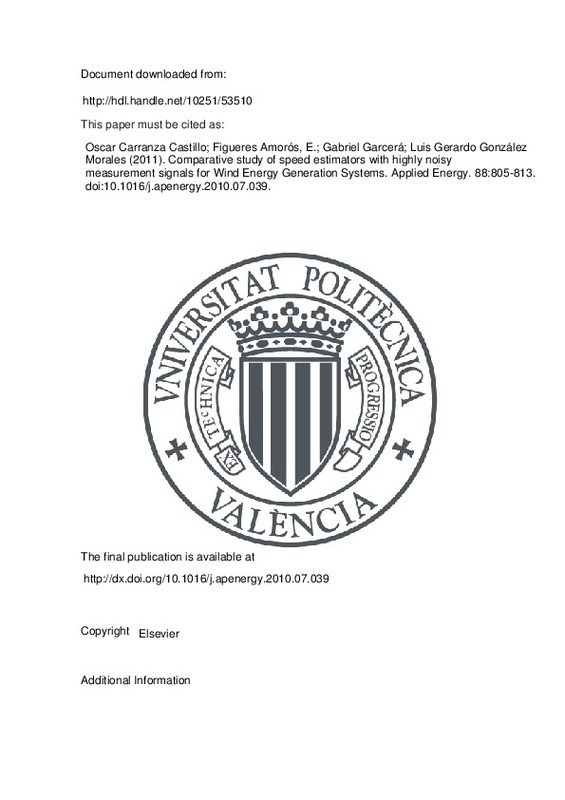González Espín, FJ.; Figueres Amorós, E.; Garcerá Sanfeliú, G. (2012). An adaptive synchronous-reference-frame phase-locked loop for power quality improvement in a polluted utility grid. IEEE Transactions on Industrial Electronics. 59(6):2718-2731. doi:10.1109/TIE.2011.2166236
Por favor, use este identificador para citar o enlazar este ítem: http://hdl.handle.net/10251/52147
|
Título:
|
An adaptive synchronous-reference-frame phase-locked loop for power quality improvement in a polluted utility grid
|
|
Autor:
|
 González Espín, Francisco José
González Espín, Francisco José

 Figueres Amorós, Emilio
Figueres Amorós, Emilio

 Garcerá Sanfeliú, Gabriel
Garcerá Sanfeliú, Gabriel
|
|
Entidad UPV:
|
Universitat Politècnica de València. Grupo de Sistemas Electrónicos Industriales
Universitat Politècnica de València. Departamento de Ingeniería Electrónica - Departament d'Enginyeria Electrònica
|
|
Fecha difusión:
|
|
|
Resumen:
|
The proper operation of grid-connected power electronics converters needs using a synchronization technique to estimate the phase of the grid voltage. The performance of this synchronization technique is related to the ...[+]
The proper operation of grid-connected power electronics converters needs using a synchronization technique to estimate the phase of the grid voltage. The performance of this synchronization technique is related to the quality of the consumed or delivered electric power. The synchronous-reference-frame phase-locked loop (SRF-PLL) has been widely used due to its ease of operation and robust behavior. However, the estimated phase can have a considerable amount of unwanted ripple if the grid voltage disturbances are not properly rejected. The aim of this paper is to propose an adaptive SRF-PLL which strongly rejects these disturbances even if the fundamental frequency of the grid voltage varies. This is accomplished by using several adaptive infinite-impulse-response notch filters, implemented by means of an inherently stable Schur-lattice structure. This structure is perfectly suited to be programmed in fixed-point DSPs (i.e., it has high mapping precision, low roundoff accumulation, and suppression of quantization limit cycle oscillations). The proposed adaptive SRF-PLL has been tested by means of the TI TMS320F2812 DSP. The obtained experimental results show that the proposed synchronization method highly rejects the undesired harmonics even if the fundamental harmonic frequency of a highly polluted grid voltage abruptly varies. © 2011 IEEE.
[-]
|
|
Palabras clave:
|
Adaptive filters
,
Adaptive signal processing
,
Lattice filters
,
Phase-locked loop
,
Power grids
,
Power quality
,
Power system harmonics
,
Three-phase electric power
,
Electric power
,
Phase locked loops
,
Power electronics
,
Signal processing
,
Synchronization
|
|
Derechos de uso:
|
Reserva de todos los derechos
|
|
Fuente:
|
IEEE Transactions on Industrial Electronics. (issn:
0278-0046
)
|
|
DOI:
|
10.1109/TIE.2011.2166236
|
|
Editorial:
|
Institute of Electrical and Electronics Engineers (IEEE)
|
|
Versión del editor:
|
http://dx.doi.org/10.1109/TIE.2011.2166236
|
|
Código del Proyecto:
|
info:eu-repo/grantAgreement/MICINN//ENE2009-13998-C02-02/ES/Estructuras Flexibles De Control De Convertidores Electronicos Para Procesado E Integracion De Energias Renovables En Microrredes/
info:eu-repo/grantAgreement/MEC//ENE2006-15521-C03-02/ES/TECNICAS DE CONTROL ROBUSTO APLICADAS A CONVERTIDORES ELECTRONICOS DE POTENCIA PARA GENERACION DISTRIBUIDA DE ENERGIA ELECTRICA CON CONEXION A REDES PUBLICAS/ /
|
|
Descripción:
|
Si el © es de IEEE cuando se deposite una versión de autor hay que poner el siguiente texto en "descripción": “© © 20xx IEEE. Personal use of this material is permitted. Permission from IEEE must be obtained for all other uses, in any current or future media, including reprinting/republishing this material for advertising or promotional purposes, creating new collective works, for resale or redistribution to servers or lists, or reuse of any copyrighted component of this work in other works.”
|
|
Agradecimientos:
|
This work was supported by the Spanish Ministry of Science and Innovation under Grants ENE2009-13998-C02-02 and ENE2006-15521-C03-02.
|
|
Tipo:
|
Artículo
|







![[Cerrado]](/themes/UPV/images/candado.png)




